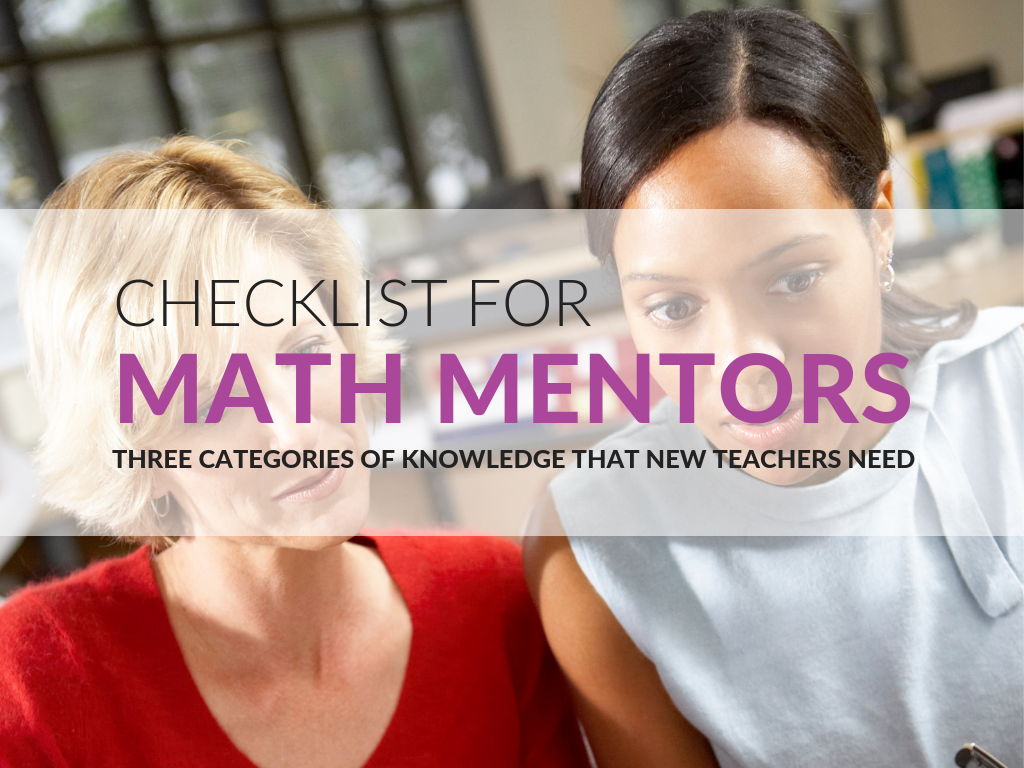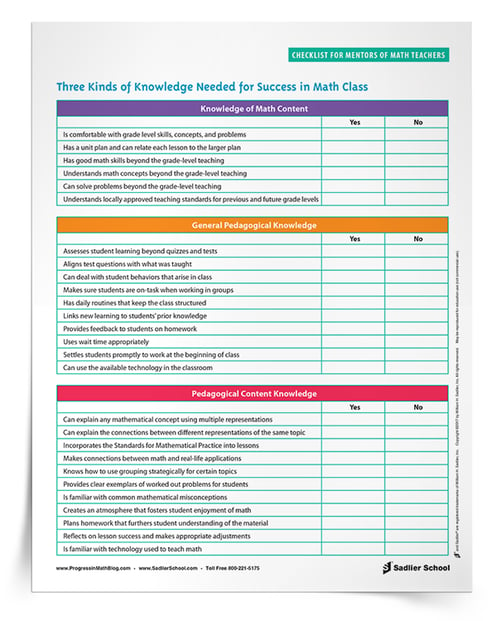June 24, 2019 other-professional-development
Mentoring New Math Teachers- 3 Categories of Knowledge They Need to Be Successful
By: Jeff Todd
Helping new teachers acclimate to their positions is one of the primary jobs of mentors. One thing that has been helpful for me in framing my discussions with newer math teachers is thinking of what kind of knowledge they need to be successful in the classroom. This article* explains how to do just that and includes a downloadable checklist mentor teachers can use when working with new teachers.
Three Categories of Knowledge Math Teachers Need to Be Successful
There are three categories of knowledge that math teachers need in order to be successful:
- knowledge of math content
- general pedagogical knowledge
- pedagogical content knowledge
Use my downloadable checklist to help you and your mentee identify the areas of strength and weakness in their knowledge about teaching math, in order to help develop a plan for their progress.
#1 Subject Matter Knowledge
Knowing math and knowing it well is a necessary requirement of being a great math teacher. However, there are a lot of great teachers with weak math knowledge, which limits their ability to help students make progress. One key aspect of math content is having knowledge of math beyond the current grade level, in terms of skills, concepts, and problems solving. I have a functional knowledge of calculus, and though I don’t teach it, I know where my students are headed. I can preview for them how some of the algebra, geometry, and number sense topics in middle school will help them in their high school classes.
In addition to knowing math above their grade levels, teachers should also be familiar with the Common Core State Standards or the math standards adopted by the district. Knowing how the curriculum is organized in their school and district helps teachers know what to teach (and what not to) at each grade level. I have begun a series of articles outlining how certain topics are covered at each grade level, and I hope you will take some time to take a look at them.
Tip for Mentors
One sign that a teacher is struggling with math content is an over-reliance on the textbook for lessons. A teacher may also just teach from one lesson to the next, without knowing how each lesson connects to larger units and the “big ideas” of math.
#2 General Pedagogical Knowledge
While there are great teachers who need help with math, there are also teachers that are good at math, but weak in general pedagogical skills. There is a whole set of skills that are learned in college pedagogy courses, and another that is learned on the job, which teachers need to be successful. These skills can include creating a safe and productive classroom, devising and interpreting formative assessments, creation and reinforcement of classroom routines, and use of technological devices in the classroom.
Tip for Mentors
An indication that teachers are struggling with general pedagogical knowledge is students’ off task behavior. Another is a one-size-fits all approach to teaching that fails to provide a variety of approaches to material or to take into account student differences.
#3 Pedagogical Content Knowledge
Lee Shulman is credited with popularizing the term pedagogical content knowledge in the 1980s. This knowledge is about knowing how to teach math—not just knowing math, and not just knowing how to teach in general—that is, it is the intersection of content and pedagogy for a particular subject. This what separates a merely adequate teacher from truly outstanding one.
Pedagogical content knowledge for math teachers includes being able to solve problems in many ways, being able to use different representations to teach a topic, and being able to point out how the different relationships relate to each other.
Teachers with good pedagogical content knowledge know how to make math comprehensible to others. They know more than one way to teach the topic and are aware of common misconceptions about a topic. And, most importantly, they are able to reflect on what went right or wrong in a lesson and to chart a course forward, particularly when students didn’t accomplish the intended objectives.
In Summary
To be more successful when you are working with new teachers, organize your thoughts about what they need into these three categories: knowledge of math content, general pedagogical knowledge, and pedagogical content knowledge.
To see a checklist of topics within these categories, click on the download and use it to organize your thoughts about the teachers you are mentoring.
* I must attribute some of the ideas in this article to my classmate at the University of Massachusetts, Lowell, Graduate School of Education, Kathy Shea. She developed these ideas in the context of working with science teachers, but they can also be applied to the math classroom.





